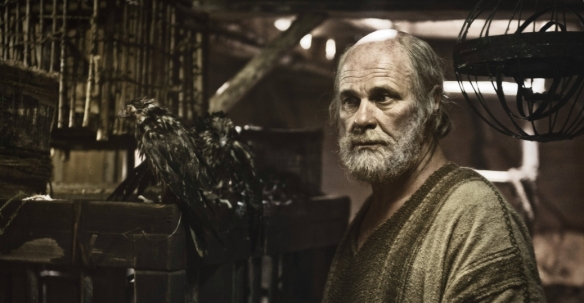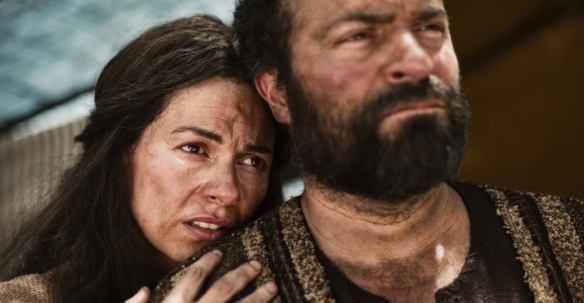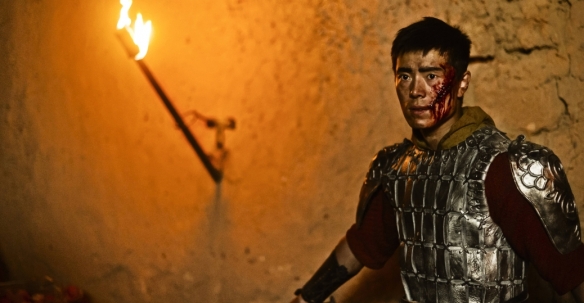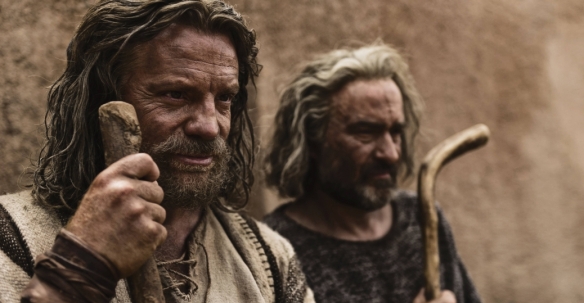Last Sunday, The History Channel debuted its new five-part miniseries, The Bible. I didn’t get a chance to watch the first episode until later in the week, but I will try to catch the premieres of the rest of the episodes and have a review post about them up later that same night. I know I’ve neglected this blog lately, but this is the exactly the sort of thing this blog is suited for, I think.
Overall I must say I am pleased that such a show, (dramatizing stories from scripture), is on the air. I admire the motivation of producer Mark Burnett, as quoted in Entertainment Weekly:
Burnett has said he made the special effects-filled project to help tackle “Bible illiteracy” among young people. “In school, you have to know a certain amount of Shakespeare, but no Bible,” Burnett told the Christian Science Monitor. “So there’s got to be a way to look at it from a pure literature point of view. If it wasn’t for the Bible, arguably Shakespeare wouldn’t have written those stories.”
I’m not so sure Shakespeare’s works are directly dependent on the Bible, but it is at least true that many works of art and literature are full of Biblical allusions and a working knowledge of scripture would be useful in studying and understanding them. But of course I don’t think that’s the main benefit for knowing what is actually written in scripture, and while I am pleased that an effort is being made to bring some of the Bible to life in this most recent project, it is not without flaws, and it is my job to point out the scriptural inaccuracies and the reasons why they matter here. I hope that my posts are another contribution in the struggle against Biblical illiteracy.
Noah and Creation
I can get behind the decision to open with Noah on the ark, reciting the creation of the world from Genesis 1 as the rains pour. The first chapter of the first book of the Bible doesn’t really lend itself to visual representation or re-enactment very easily, (but A+ for the brief shot of Adam rising up out of the dirt), and I liked that show-Noah made an explicit link between sin entering the world through the first humans’ actions and the manifestation of the Flood to “cleanse the earth.” That’s theologically spot-on.
The Lord saw how great the wickedness of the human race had become on the earth, and that every inclination of the thoughts of the human heart was only evil all the time. The Lord regretted that he had made human beings on the earth, and his heart was deeply troubled. So the Lord said, “I will wipe from the face of the earth the human race I have created—and with them the animals, the birds and the creatures that move along the ground—for I regret that I have made them.” But Noah found favor in the eyes of the Lord. –Genesis 6:5-8
The fact that it stops raining just as Noah gets to “and on the seventh day, God rested” doesn’t make it clear that the Flood was much longer than a week, though. It rained for 40 days and 40 nights, and they were on the ark for almost a year total since they had to wait for the waters to recede. The shot of a rainbow behind the floating ark in the show is not quite right, since it shouldn’t appear until after they’ve gotten off the ark and made a burnt offering sacrifice, but it’s probably good that they included it since the rainbow is such an iconic element of that story.
And God said, “This is the sign of the covenant I am making between me and you and every living creature with you, a covenant for all generations to come: I have set my rainbow in the clouds, and it will be the sign of the covenant between me and the earth. Whenever I bring clouds over the earth and the rainbow appears in the clouds, I will remember my covenant between me and you and all living creatures of every kind. Never again will the waters become a flood to destroy all life. Whenever the rainbow appears in the clouds, I will see it and remember the everlasting covenant between God and all living creatures of every kind on the earth.” –Genesis 9:12-16
One of the main complaints I have for the Noah portion of the show are that I don’t believe the ark would have been that leaky; they spent years building it and the whole thing was coated with pitch inside and out, after all. I’m sure having water pour in was for dramatic effect, but it kind of makes it look like they barely survived as opposed to having planned and prepared by God’s instructions to be spared from the destruction. At least the dimensions of the ark from the outside look pretty accurate. The other complaint is that the girl in the scenes with Noah and his wife is too young. She must be the wife of one of Noah’s sons, because the only 8 people on the ark were Noah, his wife, his three sons, and his sons’ wives, but the show made her look more like a daughter than a daughter-in-law. Relatively minor inaccuracies, and they didn’t really show enough of Noah to clarify a lot of elements, so I’d say this first segment wasn’t too bad.

Noah on the ark (source for image).
Abraham
This was my favorite segment; I thought it was mostly very well done. I particularly loved the way the relationship dynamics between Sarah, Hagar, and Abraham were portrayed–the bitterness and jealousies felt very realistic.

Abraham and Sarah. I was pleased that there weren’t any blue-eyed, blonde-haired characters populating these ancient near-eastern stories…but then a blonde-haired blue-eyed Isaac showed up. Also, why did Isaac and Sarah have British accents? That was random. (source for image)
I liked the depiction of the angelic visitors at first, but I was disappointed in the artistic license decision to embellish their role by having them kill people, with swords. And get injured in said sword-fight! I’m sorry but I just don’t think beings with the power to instantly blind an entire crowd would have a need to resort to measly mortal weapons. Also, even though they were on a mission to destroy the city and everyone in it (except Lot’s family), I was uncomfortable with the idea of the angels actually physically killing people one-on-one. I’m just not sure that’s something God’s warriors do.

A warrior angel, I guess? Do angels bleed? Maybe only when they take human form? (source for image)
As far as the depiction of the sacrifice of Isaac, I thought that the emotions were well done, and I was very glad to see that they did show Isaac carrying the wood for his own sacrifice up the mountain, because that is one of many parallel’s to Jesus’ sacrifice, (in this case to carrying his own cross to Calvary. The parallel was slightly blurred since in the show Abraham also carried a bundle of wood instead of “the fire and the knife” as it says in scripture, but at least it’s still there for people who know to look for it.)
The problem with this scene was that it deviated from the Biblical account when Abraham turned around and saw a lamb with it’s leg caught in a tree, instead of a ram with it’s horns caught in a thicket, to sacrifice in place of Isaac.
Abraham looked up and there in a thicket he saw a ram caught by its horns. He went over and took the ram and sacrificed it as a burnt offering instead of his son. So Abraham called that place The Lord Will Provide. And to this day it is said, “On the mountain of the Lord it will be provided.”
This may seem like a small change, but it’s actually quite significant. There are strict specifications for the appropriate way to make a sacrifice. The animal had to be the best that you can offer; you don’t give God an imperfect specimen. It had to be without blemish.
Do not sacrifice to the Lord your God an ox or a sheep that has any defect or flaw in it, for that would be detestable to him.
If the offering is a burnt offering from the herd, you are to offer a male without defect. You must present it at the entrance to the tent of meeting so that it will be acceptable to the Lord.
If an animal has a defect, is lame or blind, or has any serious flaw, you must not sacrifice it to the Lord your God.
The lamb in the show with its leg caught in the the tree would likely not meet the requirements for sacrifice, since its leg is probably injured. At the least bruised, at the worst twisted or broken. Either way it’s not an animal without blemish. That’s why the Biblical text includes the detail that the ram was caught in the thicket by his horns, so it’s clear that there’s no flaw on the animal’s body.
It’s a very high standard, and it may seem like a small element of the story, but it’s theologically important. Because that standard is why Jesus’ sacrifice was so critical, and so necessary. Literally no-one else could have done what he did. No other human has ever lived a life “without blemish” like he did. No-one else’s undeserved death could have offered a cleansing for the world’s sins, because no one else would ever be pure enough.
Moses
I wish they hadn’t skipped from child Isaac all the way to adult Moses! I know Moses is one of the most famous stories, but I thought part of the whole point of this show was to educate people about the Bible stories they didn’t know. And there are so many richly dramatic interludes and interesting characters in the span they skipped! *sigh* There’s so much context to the story of Exodus that gets left out if you start with Moses instead of his ancestor Joseph, who is the reason they were in Egypt to begin with…just read all of Genesis, everyone, you won’t be sorry.
This section was by far the one I liked least, because it was so poorly done, and same subject matter has been done before so they needn’t have bothered. They should have just aired The Prince of Egypt, which does a much better job overall even though it features some of the same inaccuracies as this version (like Moses not knowing about his true identity until he’s an adult.)
The burning bush scene was woefully lacking. Some of it may have been just due to budget limitations; Moses is supposed to be watching a herd of sheep but there are none to be seen, and he doesn’t perform either of the two miracles that God makes him do (turning his staff into a snake and making his hand suddenly leperous then suddenly healed) to boost his confidence that he’ll be able to convince the Israelites to follow him. The CGI for the flames on the bush didn’t even look that impressive. Moses didn’t take off his sandals, as he is instructed to do in the Bible because “the place where you are standing is holy ground.” (Exodus 3:3).
The whole scene was just far too short; show-Moses asks “but how can I set them free?”, and after hearing the reply “I will be with you,” show-Moses is suddenly super-sure of himself, throws his staff to the side, and proclaims “With your power, I will set my people free!” Compare that to the Biblical account, when Moses is still reluctant to carry out God’s bidding even after God has him perform the two aforementioned miracles at the burning bush, displaying absolutely no self-confidence and begging twice for someone else to do it instead.
Moses said to the LORD, “O Lord, I have never been eloquent, neither in the past nor since you have spoken to your servant. I am slow of speech and tongue.”
The Lord said to him, “Who gave man his mouth? Who makes him deaf or mute? Who gives him sight or makesh im blind? Is it not I, the LORD? Now go; I will help you speak and will teach you what to say.”
But Moses said, “O Lord, please send someone else to do it.”
Then the LORD’s anger burned against Moses and he said, “What about your brother, Aaron the Levite? I know he can speak well. He is already on his way to meet you, and his heart will be glad when he sees you. You shall speak to him and put words in his mouth; I will help both of you speak and will teach you what to do.”
Show-Moses just seemed overly arrogant and cocky, strutting around without any self-doubt and throwing miracles and faith certainties in people’s faces. Also, why did show-Moses have Aaron put his staff into the Nile to turn it to blood, instead of Moses doing it with his own staff as he does in the Bible? Was it to indicate that Aaron’s staff is tied also tied to miraculous power as it later grows an almond bloom as a sign he’s to be the leader under Moses? They didn’t include that part anyway, so there was really no point to confuse things the way they did. Maybe this was the show’s way of acknowledging that it was Aaron’s staff that turned into a snake in Pharaoh’s presence, before the plague of blood? It’s really the only time in the show that Aaron assists Moses, but as mentioned in the preceding paragraph, Moses actually relied on his brother’s help in a much more significant capacity.

Moses and Aaron (source for image)
I also didn’t like how they made Joshua look weak and full of doubt. Maybe I’m wanting to hero-worship him too much, because I’m sure he was a flawed human like everybody else, but he’s known for being one of the very few who had faith that God would deliver the Promised Land to them, when ten of the other twelve spies argued that it was impossible. But who knows, maybe he really was bitter and doubtful before witnessing the miraculous exodus out of Egypt…although I think the real reason the show made Joshua keep voicing doubts was so the audience would recognize him when he takes over as leader of the Israelities. The end of this episodes sets up his leading the battle of Jericho for next week.
The ten plagues were not specified, (how many people unfamiliar with the story would realize that the scene with the lit torches was meant to take place during the plague of darkness?) and I’m not even sure the showed all ten. All of Moses’ warnings to Pharaoh, and Pharaoh’s giving in and then recapitulating on his promises after numerous plagues were lifted, is reduced to quick-cuts of vaguely-identified plagues and Pharaoh saying “no.”
They only killed one lamb (which really looked more like a sheep) for Passover, instead of one for each household as scripture instructed. And most egregiously, instead of using hyssop branches to spread the blood on their door frames, they use what looks like a literal modern-day paintbrush for one house, and a dirty rag for another! I found this whole depiction very troublesome, in line with my complaints about failure to accurately depict the significance of sacrifice in the Abraham section as outlined above. The whole point of the blood on the door frames was to show that a death had already cleansed that house. You don’t show respect for cleansing sacrificial blood by smearing it around with a dirty rag! And it’s not as if this was a minor, little-known element of the story; the hyssop branch used to paint the blood on the door frames is an explicitly mentioned part of annual Passover dinners. I just don’t understand how they messed that up.
Furthermore, the crowd of Israelites was far to small. I’m sure they just didn’t have the budget for that many extras, but it looked like maybe a few dozen people, yet Exodus 12:37 says:
There were about six hundred thousand men on foot, besides women and children.
The show left out the pillars of cloud and fire that led the Israelites and that came between them and Pharaoh’s pursuing chariots to keep them at bay for the whole night while the crowd crossed the Red Sea. Now doesn’t that make more sense (and isn’t it more of a spectacle) than a ragtag bunch of newly-freed slaves somehow out-running the finest warrior chariots? These inaccuracies matter because too many people already don’t believe that Bible stories like this one really happened. It doesn’t help to deviate from the text and make them even less believable, and they aren’t suffering for drama as written.
Conclusion:
Even though there were all these issues, I have to repeat that I’m glad an attempt to portray the stories of the Bible is on television at all, and I hope more than anything that watching this series might inspire people to actually read some scripture. Because as is often the case with film adaptations, the book is better!
